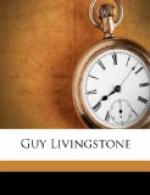Of one thing be sure; the strong temperaments who enjoy greatly, suffer greatly too—those who endure in silence, most of all. I think the wolf’s death-pang is sharper than the hare’s.
But Guy was not only patient, he was actually more cheerful than I had seen him since Constance died. He liked to see his old friends, and to hear accounts of their sport with hound and gun. To do these justice, there was not one who would not give up, gladly, the best meet of the Pytchley, or the shooting of the best cover in the county, to sit for half a day in that sick-room. He talked, too, always pleasantly and kindly to his mother and his cousin.
Poor Isabel Forrester was quite broken down by this second blow. Next to her dead husband, I believe, she loved Guy better than any one; not unnaturally, for he had petted and protected her all her life long. She could not help giving way, though she tried hard, for the sake of others. It was piteous to see her, sitting alone for hours, gazing out on the bleak winter landscape, while the tears welled slowly from under her heavy eyelids.
Foster, who was still at Kerton, came often to visit Livingstone. No one could do him so much good. The curate was just as confident and uncompromising in the discharge of his office as he was yielding and diffident when only himself was in question. He was so honest, and straightforward, and true—so free from rant or cant—so strong in his simple theology, that Guy soon trusted him implicitly when he spoke of the past and of the future that was so near. The repentance that was begun by Constance’s dying bed was completed, I am sure, on his own.
“Frank,” Guy said, one morning, suddenly, “I have written to ask Cyril Brandon to come to me. He will be here to-day. It would make me very happy if I could hear him say he forgave me.”
“Do you think you will succeed?” I asked, sadly; for I felt a nervous certainty that the pain the interview must cost him would be unavailing.
“I can not tell,” he answered, firmly; “but Foster says, and I know, that it is my duty to try. You may be present, if you like, on one condition—you must promise, whatever he may say or do, not to interfere by a look or a word.”
I did promise; but I looked forward with dread to Brandon’s coming. In an hour’s time he was announced.
It was the first time I had seen him; and I was much struck by the mingled expression of suffering and ferocity that sat, like a mask, on his worn dark face. I have seen its like but once—in a dangerous maniac’s. He walked straight up to Guy’s couch without noticing me, and stood there silent, glaring down on the sick man with his fiery black eyes.
“It is very good of you to come,” Guy said; “I scarcely hoped you would. I have wronged you, more deeply than any living man—so deeply that I could never have dared to ask your forgiveness if I had not been very near my death. Can you give me your hand? Indeed, indeed, I have repented sorely.”




